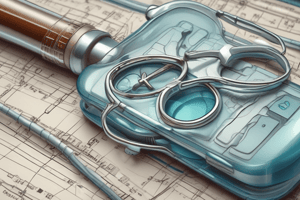Podcast
Questions and Answers
What is the primary purpose of medical instrumentation?
What is the primary purpose of medical instrumentation?
- To entertain patients during recovery
- To measure and analyze biological signals for medical purposes (correct)
- To replace traditional medication
- To develop new surgical techniques
Which of the following is NOT an application of medical instrumentation?
Which of the following is NOT an application of medical instrumentation?
- Monitoring vital signs
- Clinical laboratory analysis
- Culinary arts (correct)
- Assisting in rehabilitation
Medical instruments can be used for therapeutic applications. Which of the following describes this functionality?
Medical instruments can be used for therapeutic applications. Which of the following describes this functionality?
- Creating surgical instruments for new procedures
- Delivering therapeutic treatments to patients (correct)
- Providing entertainment during surgeries
- Analyzing blood samples only
Which physiological signals can be measured and monitored by medical instruments?
Which physiological signals can be measured and monitored by medical instruments?
How have advances in medical instrumentation impacted telemedicine?
How have advances in medical instrumentation impacted telemedicine?
What role does medical instrumentation play in rehabilitation?
What role does medical instrumentation play in rehabilitation?
Which statement accurately describes the function of medical instrumentation in diagnostics?
Which statement accurately describes the function of medical instrumentation in diagnostics?
In what way do medical instruments contribute to surgical procedures?
In what way do medical instruments contribute to surgical procedures?
Study Notes
Medical Instrumentation: Definition and Applications
- Definition: Medical instrumentation encompasses devices and technologies that measure, record, and analyze biological signals and physiological functions for medical purposes.
- Purpose: These instruments aid in monitoring, diagnosing, and treating medical conditions by providing data about the body's systems, including cardiovascular, respiratory, neurological, and muscular functions.
- Interdisciplinary Field: Combines principles from electronics, mechanical engineering, biology, and medicine.
- Applications across healthcare:
- Diagnostic: Measuring and analyzing physiological parameters to accurately diagnose conditions.
- Monitoring: Tracking vital signs and physiological parameters in real time for health assessment.
- Therapeutic: Delivering therapeutic treatments to patients.
- Clinical Laboratory: Analyzing samples in labs for diagnostic purposes.
- Prosthetics and Rehabilitation: Assisting patients in recovery and improving quality of life.
- Telemedicine and Remote Monitoring: Enabling remote patient monitoring outside clinical settings.
- Surgical: Assisting surgeons in performing delicate operations.
Medical Instrumentation Functions:
- Measurement and Monitoring: Tracking physiological signals like heart rate, oxygen levels, and brain activity.
- Diagnosis: Facilitating diagnoses through imaging, blood tests, and analyzing physiological data.
- Treatment and Therapeutic Intervention: Delivering treatments like drug delivery, defibrillation, or mechanical ventilation.
- Rehabilitation: Enhancing quality of life through prosthetics, hearing aids, and other assistive devices.
Studying That Suits You
Use AI to generate personalized quizzes and flashcards to suit your learning preferences.
Related Documents
Description
Explore the definition and applications of medical instrumentation in healthcare. This quiz covers how various devices and technologies are used for monitoring, diagnosing, and treating medical conditions. Discover the interdisciplinary nature of this field and its significance in clinical practices.




